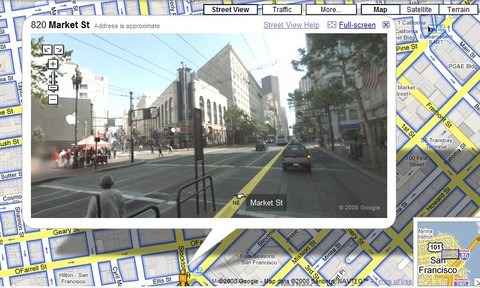When It Comes To GPS Privacy, Where Exactly Are We?
Matters of privacy have been in the news recently, as Google's Street View cars continue their initial mapping of the UK. The search giant was criticised by campaigners concerned that their street-level photography constituted an intrusion of privacy and asked the Information Commissioner's Office (ICO) to look into the project. However the ICO ruled it was "satisfied" that Google's face and numberplate blurring, "opt-out" settings and other controls were sufficient.
One of the more interesting suggestions was that "web-savvy" burglars could use the Street View information to remotely "case the joint". Google's answer is that the delay between photos being taken and them being uploaded minimizes any real risk; I'd personally think that users on social networking sites such as Facebook, together with those blogging their daily lives, probably open themselves up to more risk by discussing their holiday plans. A still photo on Google Maps doesn't say whether the family will be home (or the dog locked up at the nearby kennels!)
Over on our Apple-obsessed sister site iPhoneBuzz, they've been discussing controversy over the prospect of GPS-tagged images being released online. The iPhone 3G's new GPS features – which can add location data to photos taken, as well as locate users on a map – could be, according to some, allowing people to pinpoint your position.
Location-aware services have been described as the next big growth area in software, and as mobile devices get more comprehensive (and more used to integrating our geography as well as the private data we're used to casually giving up) these issues are going to get more prevalent. Personally, I believe the usefulness of Google Street View represents more of a benefit than its risks; having recently moved from the UK to San Francisco, we used Street View to check out potential neighborhoods when apartment-hunting. We also used it to familiarise ourselves with the building's appearance and exact location in advance, saving time (and walking!) when racing around the city to open-house viewings.

Right now, to use the iPhone as an example, GPS asks each time it tries to tag photos or locate you on Google Maps. Some see that as a frustration (I know I did the first few times) and would prefer a "Don't ask me this again" switch. I'm not sure what sort of message that would send out to developers and marketers, though: that we don't place much value on the privacy of our physical location, perhaps? That paves the way for an opt-out, rather than an opt-in system, where you must actively tell a device to keep quiet on your coordinates. Maybe you trust Apple to do that legitimately and securely, but would you trust everyone else?
I'm genuinely interested in hearing your opinions on this one; my natural addiction to new tech and making my life easier is up against my cynicism. Have you used Google Street View for something more than just checking out your own street? Are you waiting for the Google camera-cars to drive by, so you can immediately check the "no photos of me, please" box? Is this the beginning of a slippery slope? Let me know your thoughts in the comments.
